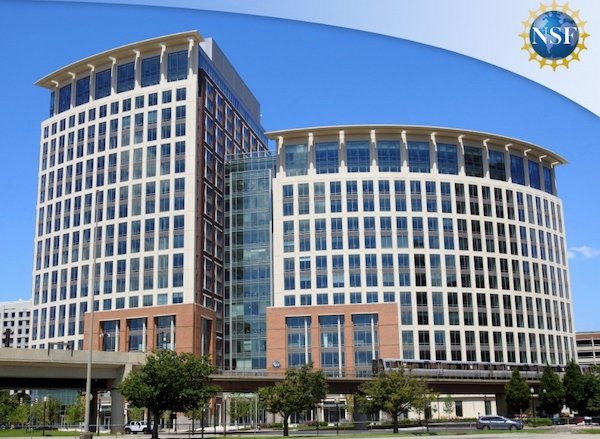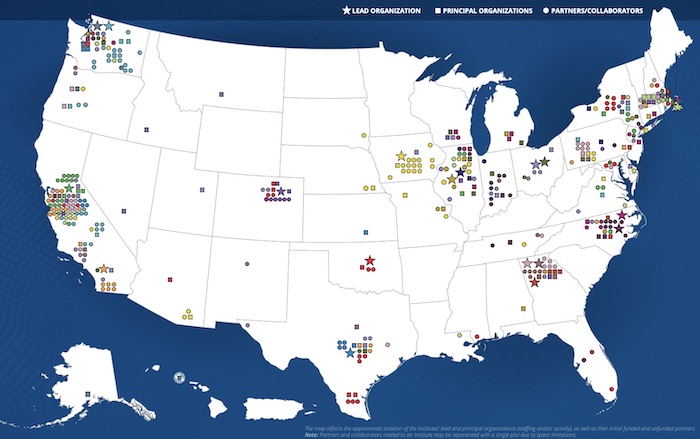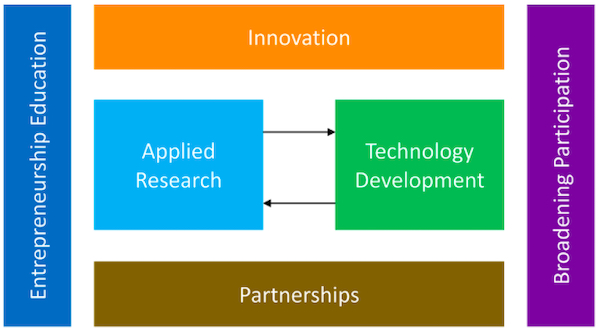The National Science Foundation supports fundamental research and education in science and engineering with a significant annual budget. Several projects have recently been funded, which will help to strengthen the engineering workforce, drive advances in AI, and transform mobile networking.
What Is the National Science Foundation?
The National Science Foundation (NSF) is an independent US federal agency that promotes the progress of science, advances national health, and secures national defenses. The NSF has an annual budget of $8.5 billion as of 2021, which allows it to fund around 25 percent of federally-supported research conducted by American colleges and universities.

NSF's headquarters in Virginia. Image used courtesy of the NSF
Covering fields such as mathematics, computer science, and social sciences, NSF supports engineering discovery and education to create a better future. Basic research in areas such as manufacturing, healthcare, and infrastructure has the potential to make a huge difference to NSF’s goals. The foundation also supports small businesses and industries to help get innovations to market sooner.
NSF Grants That Have Recently Been Approved
The NSF has recently awarded funding to several projects. These projects include:
- Teaching software to strengthen the engineering workforce
- AI centers to optimize edge computing
- Management of the radio frequency spectrum
Montana State University: Teaching Software
Montana State University researchers have recently received a $300,000 grant from NSF to help fund their innovative teaching software. The intelligent web-based platform aims to help engineering students integrate writing skills into their work and identify gaps in their conceptual thinking.

Photo of Jim Becker, the MSU professor of electrical and computer engineering who was awarded the NSF grant. Photo by Adrian Sanchez-Gonzalez
The overall aim is to advance knowledge on how to prepare students for engineering courses, improve retention, and ultimately strengthen the engineering workforce.
Yale: Artificial Intelligence Institutes
The NSF has also recently invested $220 million to establish 11 artificial intelligence (AI) institutes. All of the institutes are focused on advancing AI to improve various areas of society, whether to help elderly adults be more independent, improve agriculture, or increase equity and representation.
Yale researchers will be leading two of these institutes, each of which will receive $20 million over five years. One of the institutes will focus on pushing the mathematical frontiers of optimization and the other on cost-effective edge computing and network systems.
Duke: Athena Center for AI
One of the $20 million five-year grants explained above will go toward the Duke-led Athena center. The Athena Institute aims to develop advanced mobile networks and data centers to improve internet speed, security, and accessibility on a national scale.

A map of all NSF-led national AI research institutes. Image from the NSF's interactive AI map
The Institute hopes to move some of the data processing workloads from large distant server farms closer to the data’s origin to make services faster and more power-efficient.
Notre Dame: SpectrumX Project
Notre Dame’s SpectrumX project has recently been initiated by a five-year $25 million grant. SpectrumX is the world’s largest academic hub, home to a diverse and interdisciplinary group of scientists, engineers, and educators. The aim of SpectrumX is to conduct strategic research and workforce development projects to transform spectrum management.
The project is of great importance as the explosion of wireless applications has put the radio frequency spectrum at a premium.

SpectrumX telescope. Image used courtesy of Notre Dame News
How Can Electrical Engineers Get Involved?
The NSF has several programs and funding opportunities open to electrical engineers. Current deadlines run from December 2021 through to June 2022 with some accepting proposals at any time. Funds can help engineers develop technology, accelerate their research, test how end-users use solutions, learn how to develop sustainable business plans, and bring innovations to market.
NSF Innovation Corps (I-Corps): $50,000 Over Six Months
The I-COrps program can help engineers translate their innovation to the marketplace. During the seven-week program, attendees learn about customer discovery and business planning from seasoned entrepreneurs.
Partnerships for Innovation (PFI): $250,000 Over 18 Months
The PFI program helps engineers develop their technology into a prototype. The aims of the project are to commercialize products, create new collaborations, license research outputs, and train for future innovation.

Elements of a PFI proposal. Image used courtesy of the NSF
America’s Seed Fund: $256,000 Over 6–12 Months
America’s Seed Fund is powered by the NSF with startups receiving up to $2 million in support of translational research and development. Hundreds of deep-tech startups take advantage of the funding each year, turning discoveries into products and services that improve society.
Convergence Accelerator: $750,000 Over 12 Months
The Convergence Accelerator drives basic research and discoveries forward to commercial solutions. Multidisciplinary teams compromise researchers, innovators, and other partners, enabling solutions to be developed from multiple perspectives.
While there are various timeframes to these projects and conditions that need to be met, the funding opportunities can accelerate engineering progress and improve societal well-being as a result.
